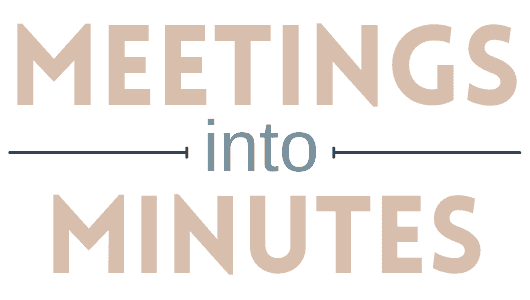Whether you are a personal or executive assistant, or whether you’re simply a team member who sometimes has to take minutes, knowing how to effectively complete your job is a must. Minute-taking isn’t a simple task, especially to someone who has never done it before.
Minutes help with communication needs at work. But for some organisations, it’s also a way to stay compliant. Minutes are legal documents are treated as such if ever the need arises. This is why it is so important for the minutes to be accurate and professional. Whether it’s for formal meetings such as AGM’s and Board meetings or just an informal team catch up, there are a few ways you can improve your minute taking skills.
1. Write The Minutes As Soon As Possible
If you are in charge of handling the minutes for your next meeting, take the minutes whilst you are in attendance. Don’t leave it for a few weeks to complete the final set of minutes, either. Minutes aren’t an informal document where you write a few notes on what happened.
Once the meeting is over, start by clarifying points before completing the final version. If someone else can give it the once over, even better. The second set of eyes can always help you to find any potential mistakes or errors.
2. Don’t Forget To Include Attendees
It’s a simple part of taking minutes, but one that is sometimes forgotten. You will need to include the names of all attendees on the agenda, as well as the people who actually show up. These two lists could very well be different when it comes to the meeting time. Make a note at the top of your minutes of all people in attendance and those who may have sent apologies for not being there.
3. Use A Template
If you work for a business or organisation, there is a chance that you already have a template to use for your minute-taking needs. If there isn’t a standard template, you can make one. Once a template has been established, your minutes will be able to be recorded in a formal and succinct way. But, your meetings will also run better. Having the same format to follow through with will help your meetings stay concise, accurate and to the point.
4. Use An Audio Recording
If your company policy allows it, record the audio from the meeting to ensure all points are taken down within your minutes. This is also useful to ensure you have covered all points and haven’t missed any important factors. You can listen to the audio after the meeting and go through your minutes at the same time. Just ensure you follow your company policy in regards to taking and destroying audio files from meetings. If you’re unsure of the policy, ask your management team.
5. Stay Neutral
We all know there are times in the office when people don’t get along. Or, you may disagree with ideas put forward by other people during a meeting. As a minute-taker, this puts you in jeopardy of writing biased notes/minutes. When you’re in a meeting and taking the minutes, it’s always important to ensure you stay neutral. Regardless of your positioning and your opinion on any matters mentioned, your minutes will need to reflect on exactly what happens, what is said and decisions made, without your personal opinion injected into the minutes.
6. Take A Minute Taking Course
If you really want to up your minute-taking game, enrolling in a minute taking short course may be a great option. These courses can enable you to understand everything there is to know about taking minutes. Because minutes are quite important, courses that specialise in this task, such as Board minute training, will help you immensely.
If you want to improve your minute-taking skills and you are based in Sydney, Meetings Into Minutes can help. We offer a minute taking training course to ensure you can feel confident the next time you need to take minutes at your business or organisation. Get in touch with Meetings Into Minutes to discuss our new course or to enrol today.





